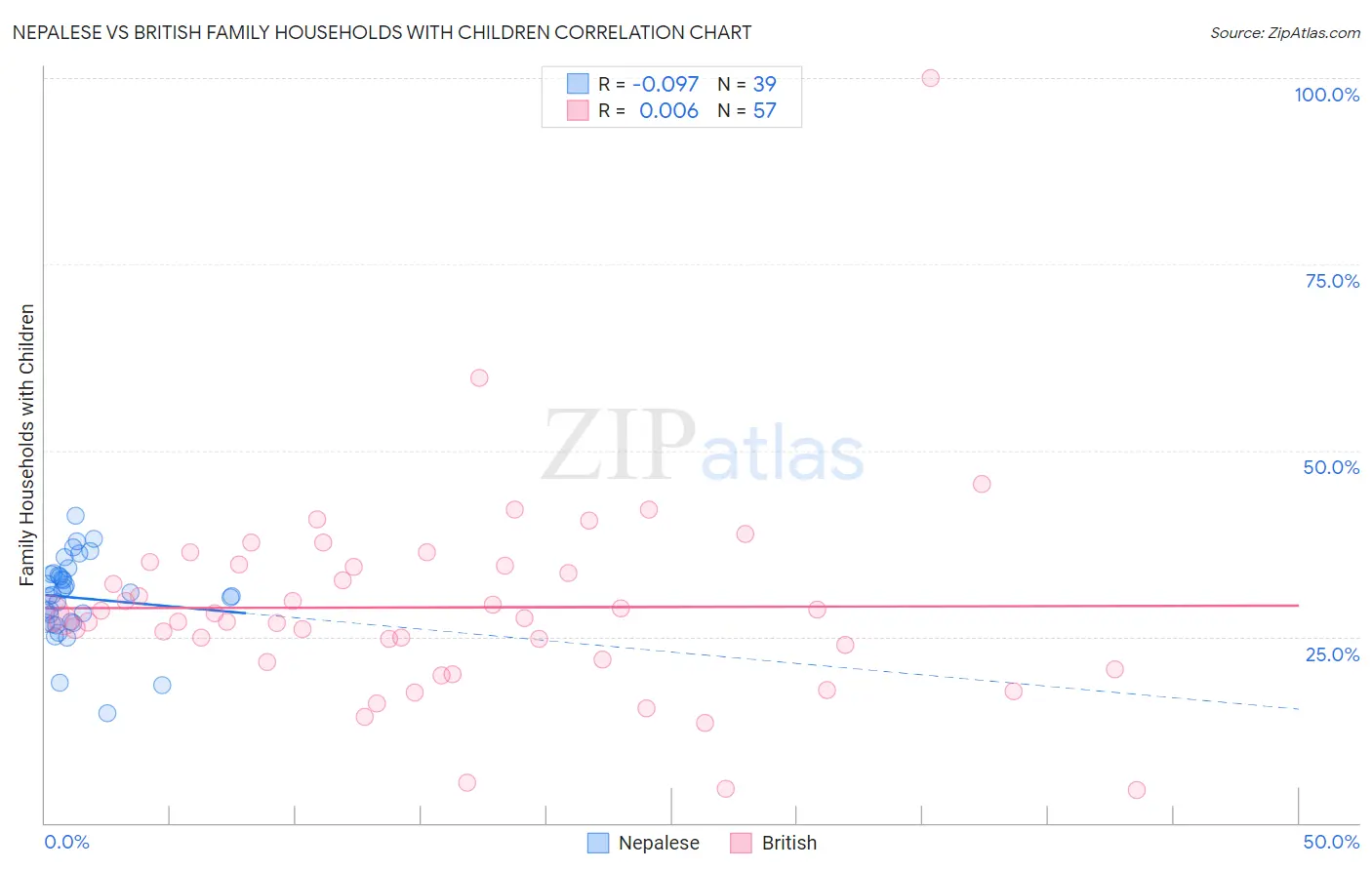Nepalese vs British Family Households with Children
COMPARE
Nepalese
British
Family Households with Children
Family Households with Children Comparison
Nepalese
British
30.5%
FAMILY HOUSEHOLDS WITH CHILDREN
100.0/ 100
METRIC RATING
11th/ 347
METRIC RANK
27.4%
FAMILY HOUSEHOLDS WITH CHILDREN
49.9/ 100
METRIC RATING
175th/ 347
METRIC RANK
Nepalese vs British Family Households with Children Correlation Chart
The statistical analysis conducted on geographies consisting of 24,519,269 people shows a slight negative correlation between the proportion of Nepalese and percentage of family households with children in the United States with a correlation coefficient (R) of -0.097 and weighted average of 30.5%. Similarly, the statistical analysis conducted on geographies consisting of 530,729,097 people shows no correlation between the proportion of British and percentage of family households with children in the United States with a correlation coefficient (R) of 0.006 and weighted average of 27.4%, a difference of 11.2%.

Family Households with Children Correlation Summary
| Measurement | Nepalese | British |
| Minimum | 14.7% | 4.4% |
| Maximum | 41.2% | 100.0% |
| Range | 26.5% | 95.6% |
| Mean | 30.2% | 28.9% |
| Median | 30.6% | 27.6% |
| Interquartile 25% (IQ1) | 26.8% | 21.8% |
| Interquartile 75% (IQ3) | 33.3% | 34.6% |
| Interquartile Range (IQR) | 6.5% | 12.8% |
| Standard Deviation (Sample) | 5.5% | 13.9% |
| Standard Deviation (Population) | 5.4% | 13.8% |
Similar Demographics by Family Households with Children
Demographics Similar to Nepalese by Family Households with Children
In terms of family households with children, the demographic groups most similar to Nepalese are Immigrants from Fiji (30.5%, a difference of 0.080%), Thai (30.6%, a difference of 0.40%), Yakama (30.8%, a difference of 0.88%), Immigrants from Pakistan (30.2%, a difference of 0.88%), and Afghan (30.2%, a difference of 1.1%).
| Demographics | Rating | Rank | Family Households with Children |
| Mexicans | 100.0 /100 | #4 | Exceptional 31.4% |
| Tongans | 100.0 /100 | #5 | Exceptional 31.2% |
| Immigrants | India | 100.0 /100 | #6 | Exceptional 31.0% |
| Immigrants | Central America | 100.0 /100 | #7 | Exceptional 31.0% |
| Yakama | 100.0 /100 | #8 | Exceptional 30.8% |
| Thais | 100.0 /100 | #9 | Exceptional 30.6% |
| Immigrants | Fiji | 100.0 /100 | #10 | Exceptional 30.5% |
| Nepalese | 100.0 /100 | #11 | Exceptional 30.5% |
| Immigrants | Pakistan | 100.0 /100 | #12 | Exceptional 30.2% |
| Afghans | 100.0 /100 | #13 | Exceptional 30.2% |
| Bangladeshis | 100.0 /100 | #14 | Exceptional 30.1% |
| Immigrants | South Central Asia | 100.0 /100 | #15 | Exceptional 30.0% |
| Immigrants | Afghanistan | 100.0 /100 | #16 | Exceptional 30.0% |
| Hispanics or Latinos | 100.0 /100 | #17 | Exceptional 29.9% |
| Salvadorans | 100.0 /100 | #18 | Exceptional 29.9% |
Demographics Similar to British by Family Households with Children
In terms of family households with children, the demographic groups most similar to British are White/Caucasian (27.4%, a difference of 0.0%), Immigrants from China (27.4%, a difference of 0.010%), Ugandan (27.4%, a difference of 0.020%), Spanish American (27.4%, a difference of 0.020%), and Immigrants from Argentina (27.5%, a difference of 0.050%).
| Demographics | Rating | Rank | Family Households with Children |
| Immigrants | Kuwait | 60.9 /100 | #168 | Good 27.5% |
| Seminole | 56.9 /100 | #169 | Average 27.5% |
| Cherokee | 56.7 /100 | #170 | Average 27.5% |
| Blackfeet | 54.3 /100 | #171 | Average 27.5% |
| Israelis | 53.9 /100 | #172 | Average 27.5% |
| Immigrants | Argentina | 52.2 /100 | #173 | Average 27.5% |
| Whites/Caucasians | 50.0 /100 | #174 | Average 27.4% |
| British | 49.9 /100 | #175 | Average 27.4% |
| Immigrants | China | 49.6 /100 | #176 | Average 27.4% |
| Ugandans | 49.2 /100 | #177 | Average 27.4% |
| Spanish Americans | 48.9 /100 | #178 | Average 27.4% |
| Turks | 46.9 /100 | #179 | Average 27.4% |
| Immigrants | Turkey | 46.9 /100 | #180 | Average 27.4% |
| Aleuts | 46.7 /100 | #181 | Average 27.4% |
| Puget Sound Salish | 46.2 /100 | #182 | Average 27.4% |